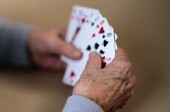
WEDNESDAY, May 27, 2015 (HealthDay News) —
Young men who are chronic gamblers probably suffer from depression, a new study suggests.
The Canadian researchers also found boys with impulsive behaviors in childhood were more likely to gamble later in life.
“Gambling problems may be more a personal problem similar to an addiction: Once acquired, they are difficult to get rid of,” wrote study leader Frederic Dussault, from the University of Quebec at Montreal.
In conducting the study, researchers examined data on nearly 900 kindergarten boys since 1984. The boys were from low-income areas in Montreal. Over time, information on their families, as well as the quality of their relationships with their parents and friends, was compiled. The researchers also analyzed how often the boys acted impulsively.
When the boys reached the ages of 17, 23 and 28, they were also asked if they had gambling problems or symptoms of depression. The researchers found only 3 percent of the young men had a chronic gambling problem. But nearly three-quarters of those with a serious gambling issue also suffered from depression.
These problems worsened over time, according to the study published recently in the Journal of Gambling Studies.
Teens and young adults with very impulsive behavior were also more likely to become depressed and develop a gambling problem. Unlike delinquent behavior like theft and violence, chronic gambling issues didn’t improve once the boys grew older.
Gambling problems and depression should be treated simultaneously, the researchers concluded. Early prevention efforts should also focus on specific risk factors, such as impulsive behavior, they noted.
More information
The U.S. National Institutes of Health provides more information on compulsive gambling.
Copyright © 2026 HealthDay. All rights reserved.

